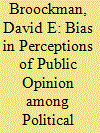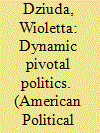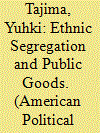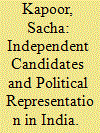|
|
|
Sort Order |
|
|
|
Items / Page
|
|
|
|
|
|
|
| Srl | Item |
| 1 |
ID:
160551


|
|
|
|
|
| Summary/Abstract |
Although anonymity is a central feature of liberal democracies—not only in the secret ballot, but also in campaign funding, publishing political texts, masked protests, and graffiti—it has so far not been conceptually grounded in democratic theory. Rather, it is treated as a self-explanatory concept related to privacy. To overcome this omission, this article develops a complex understanding of anonymity in the context of democratic theory. Drawing upon the diverse literature on anonymity in political participation, it explains anonymity as a highly context-dependent identity performance expressing private sentiments in the public sphere. The contradictory character of its core elements—identity negation and identity creation—results in three sets of contradictory freedoms. Anonymity affords (a) inclusion and exclusion, (b) subversion and submission, and (c) honesty and deception. This contradictory character of anonymity's affordances illustrates the ambiguous role of anonymity in democracy.
|
|
|
|
|
|
|
|
|
|
|
|
|
|
|
|
| 2 |
ID:
160556


|
|
|
|
|
| Summary/Abstract |
The conservative asymmetry of elite polarization represents a significant puzzle. We argue that politicians can maintain systematic misperceptions of constituency opinion that may contribute to breakdowns in dyadic representation. We demonstrate this argument with original surveys of 3,765 politicians’ perceptions of constituency opinion on nine issues. In 2012 and 2014, state legislative politicians from both parties dramatically overestimated their constituents’ support for conservative policies on these issues, a pattern consistent across methods, districts, and states. Republicans drive much of this overestimation. Exploiting responses from politicians in the same district, we confirm these partisan differences within individual districts. Further evidence suggests that this overestimation may arise due to biases in who contacts politicians, as in recent years Republican citizens have been especially likely to contact legislators, especially fellow Republicans. Our findings suggest that a novel force can operate in elections and in legislatures: Politicians can systematically misperceive what their constituents want.
|
|
|
|
|
|
|
|
|
|
|
|
|
|
|
|
| 3 |
ID:
160557


|
|
|
|
|
| Summary/Abstract |
After describing a newly assembled dataset consisting of almost 9,000 local appropriations made by the U.S. Congress between 1789 and 1882, we test competing accounts of the politics surrounding them before offering a more nuanced, historically contingent view of the emergence of the pork barrel. We demonstrate that for most of this historical period—despite contemporary accusations of crass electoral motives—the pattern of appropriations is largely inconsistent with accounts of distributive politics grounded in a logic of legislative credit-claiming. Instead, support for appropriations in the House mapped cleanly onto the partisan/ideological structure of Congress for most of this period, and only in the 1870s produced the universalistic coalitions commonly associated with pork-barrel spending. We trace this shift to two historical factors: the emergence of a solid Democratic South, and growth in the fraction of appropriations funding recurrent expenditures on extant projects rather than new starts.
|
|
|
|
|
|
|
|
|
|
|
|
|
|
|
|
| 4 |
ID:
160562


|
|
|
|
|
| Summary/Abstract |
Can positive social contact between members of antagonistic groups reduce prejudice and discrimination? Despite extensive research on social contact, observational studies are difficult to interpret because prejudiced people may select out of contact with out-group members. We overcome this problem by conducting an education-based, randomized field experiment—the Urban Youth Vocational Training program (UYVT)—with 849 randomly sampled Christian and Muslim young men in riot-prone Kaduna, Nigeria. After sixteen weeks of positive intergroup social contact, we find no changes in prejudice, but heterogeneous-class subjects discriminate significantly less against out-group members than subjects in homogeneous classes. We trace this finding to increased discrimination by homogeneous-class subjects compared to non-UYVT study participants, and we highlight potentially negative consequences of in-group social contact. By focusing on skill-building instead of peace messaging, our intervention minimizes reporting bias and offers strong experimental evidence that intergroup social contact can alter behavior in constructive ways, even amid violent conflict.
|
|
|
|
|
|
|
|
|
|
|
|
|
|
|
|
| 5 |
ID:
160559


|
|
|
|
|
| Summary/Abstract |
A prerequisite for the durability of authoritarian regimes as well as their effective governance is the regime’s ability to gather reliable information about the actions of lower-tier officials. Allowing public participation in the form of online complaints is one approach authoritarian regimes have taken to improve monitoring of lower-tier officials. In this paper, we gain rare access to internal communications between a monitoring agency and upper-level officials in China. We show that citizen grievances posted publicly online that contain complaints of corruption are systematically concealed from upper-level authorities when they implicate lower-tier officials or associates connected to lower-tier officials through patronage ties. Information manipulation occurs primarily through omission of wrongdoing rather than censorship or falsification, suggesting that even in the digital age, in a highly determined and capable regime where reports of corruption are actively and publicly voiced, monitoring the behavior of regime agents remains a challenge.
|
|
|
|
|
|
|
|
|
|
|
|
|
|
|
|
| 6 |
ID:
160558


|
|
|
|
|
| Summary/Abstract |
We analyze a dynamic extension of a parsimonious model of lawmaking in which preferences evolve over time and today’s policy becomes tomorrow’s status quo. Unlike in existing models of pivotal politics, policy makers’ voting behavior depends on the institutional environment and on their expectations about future economic and political shocks. Relative to sincere voting, the equilibrium behavior exhibits a strategic polarization effect, which increases with the degree of consensus required by the institution, the volatility of the policy environment, and the expected ideological polarization of the future policy makers. The equilibrium behavior also exhibits a strategic policy bias, which works against any exogenous policy bias embedded in the voting rule. Our analysis implies that the existing literature underestimates the inertial effect of checks and balances and overestimates the impact of institutional biases such as fiscally conservative budget procedures.
|
|
|
|
|
|
|
|
|
|
|
|
|
|
|
|
| 7 |
ID:
160561


|
|
|
|
|
| Summary/Abstract |
This article contributes to the study of ethnic diversity and public goods provision by assessing the role of the spatial distribution of ethnic groups. Through a new theory that we call spatial interdependence, we argue that the segregation of ethnic groups can reduce or even neutralize the “diversity penalty” in public goods provision that results from ethnic fractionalization. This is because local segregation allows communities to use disparities in the level of public goods compared with other communities as leverage when advocating for more public goods for themselves, thereby ratcheting up the level of public goods across communities. We test this prediction on highly disaggregated data from Indonesia and find strong support that, controlling for ethnic fractionalization, segregated communities have higher levels of public goods. This has an important and underexplored implication: decentralization disadvantages integrated communities vis-à-vis their more segregated counterparts.
|
|
|
|
|
|
|
|
|
|
|
|
|
|
|
|
| 8 |
ID:
160560


|
|
|
|
|
| Summary/Abstract |
Conventional wisdom assumes that increased censorship will strictly decrease access to information. We delineate circumstances when increases in censorship expand access to information for a substantial subset of the population. When governments suddenly impose censorship on previously uncensored information, citizens accustomed to acquiring this information will be incentivized to learn methods of censorship evasion. These evasion tools provide continued access to the newly blocked information—and also extend users’ ability to access information that has long been censored. We illustrate this phenomenon using millions of individual-level actions of social media users in China before and after the block of Instagram. We show that the block inspired millions of Chinese users to acquire virtual private networks, and that these users subsequently joined censored websites like Twitter and Facebook. Despite initially being apolitical, these new users began browsing blocked political pages on Wikipedia, following Chinese political activists on Twitter, and discussing highly politicized topics such as opposition protests in Hong Kong.
|
|
|
|
|
|
|
|
|
|
|
|
|
|
|
|
| 9 |
ID:
160563


|
|
|
|
|
| Summary/Abstract |
We estimate the causal effect of independent candidates on voter turnout and election outcomes in India. To do this, we exploit exogenous changes in the entry deposit candidates pay for their participation in the political process, changes that disproportionately excluded candidates with no affiliation to established political parties. A one standard deviation increase in the number of independent candidates increases voter turnout by more than 6 percentage points, as some voters choose to vote rather than stay home. The vote share of independent candidates increases by more than 10 percentage points, as some existing voters switch who they vote for. Thus, independents allow winning candidates to win with less vote share, decrease the probability of electing a candidate from the governing coalition by about 31 percentage points, and ultimately increase the probability of electing an ethnic-party candidate. Altogether, the results imply that the price of participation by independents is constituency representation in government.
|
|
|
|
|
|
|
|
|
|
|
|
|
|
|
|
| 10 |
ID:
160550


|
|
|
|
|
| Summary/Abstract |
The jury is a paradigmatic example of a democratic institution that may be justified strictly on instrumental and epistemic grounds: its ability to yield just outcomes. Yet why should we have confidence in its ability? The jury's reliability derives from the jurors’ status as local experts (hierarchical equality), as well as near-universal eligibility and selection by lot (horizontal equality): This dual egalitarianism is a condition of the jury's epistemic value. Yet ordinary citizens thereby acquire an interest in epistemic respect or recognition of their presumptively equal competence to judge. The instrumental value of the jury and intrinsic (respect-based) value of jury service may thus be reconciled; although trade-offs between just verdicts and respectful treatment are possible, the jury's ability to attain just verdicts may be improved by reforms generated by concerns about respectful treatment of jurors. This framework sheds light on the justification of democratic institutions more generally.
|
|
|
|
|
|
|
|
|
|
|
|
|
|
|
|
| 11 |
ID:
160549


|
|
|
|
|
| Summary/Abstract |
States often violate international agreements, both accidentally and intentionally. To process complaints efficiently, states can create formal, pretrial procedures in which governments can negotiate with litigants before a case ever goes to court. If disputes are resolved during pretrial negotiations, it can be very difficult to tell what has happened. Are governments coming into compliance? If so, are they only doing so when they have accidentally committed a violation or even when they are intentionally resisting? Or are challenges simply being dropped? This paper presents a formal model to address these questions. We develop our theory in the context of the European Union (EU). To test our model, we collect a new dataset of over 13,000 Commission infringement cases against EU member states (2003–2013). Our results suggest that accidental and intentional noncompliance both occur, but that intentional noncompliance is more common in the EU. We find that the Commission is an effective, if imperfect, monitor and enforcer of international law. The Commission can correct intentional noncompliance, but not always. It strategically drops cases that it believes it is unlikely to win.
|
|
|
|
|
|
|
|
|
|
|
|
|
|
|
|
| 12 |
ID:
160555


|
|
|
|
|
| Summary/Abstract |
This paper theorizes three forms of bias that might limit women's representation: outright hostility, double standards, and a double bind whereby desired traits present bigger burdens for women than men. We examine these forms of bias using conjoint experiments derived from several original surveys—a population survey of American voters and two rounds of surveys of American public officials. We find no evidence of outright discrimination or of double standards. All else equal, most groups of respondents prefer female candidates, and evaluate men and women with identical profiles similarly. But on closer inspection, all is not equal. Across the board, elites and voters prefer candidates with traditional household profiles such as being married and having children, resulting in a double bind for many women. So long as social expectations about women's familial commitments cut against the demands of a full-time political career, women are likely to remain underrepresented in politics.
|
|
|
|
|
|
|
|
|
|
|
|
|
|
|
|
| 13 |
ID:
160553


|
|
|
|
|
| Summary/Abstract |
Social norms are thought to motivate behaviors like political participation, but context should influence both the content and activation of these norms. I show that both race and neighborhood context moderate the social value of political participation in the United States. Using original survey data and a survey experiment, I find that Whites, Blacks, and Latinos not only conceptualize participation differently, but also asymmetrically reward those who are politically active, with minority Americans often providing more social incentives for participation than Whites. I combine this survey data with geographic demography from the American Community Survey and find that neighborhood characteristics outpace individual-level indicators in predicting the social value of political participation. The findings suggest that scholars of political behavior should consider race, place, and social norms when seeking to understand participation in an increasingly diverse America.
|
|
|
|
|
|
|
|
|
|
|
|
|
|
|
|
| 14 |
ID:
160552


|
|
|
|
|
| Summary/Abstract |
How does spatial scale affect support for public policy? Does supporting housing citywide but “Not In My Back Yard” (NIMBY) help explain why housing has become increasingly difficult to build in once-affordable cities? I use two original surveys to measure how support for new housing varies between the city scale and neighborhood scale. Together, an exit poll of 1,660 voters during the 2015 San Francisco election and a national survey of over 3,000 respondents provide the first experimental measurements of NIMBYism. While homeowners are sensitive to housing’s proximity, renters typically do not express NIMBYism. However, in high-rent cities, renters demonstrate NIMBYism on par with homeowners, despite continuing to support large increases in the housing supply citywide. These scale-dependent preferences not only help explain the deepening affordability crisis, but show how institutions can undersupply even widely supported public goods. When preferences are scale dependent, the scale of decision-making matters.
|
|
|
|
|
|
|
|
|
|
|
|
|
|
|
|
| 15 |
ID:
160554


|
|
|
|
|
| Summary/Abstract |
Political observers, campaign experts, and academics alike argue bitterly over whether it is more important for a party to capture ideologically moderate swing voters or to encourage turnout among hardcore partisans. The behavioral literature in American politics suggests that voters are not informed enough, and are too partisan, to be swing voters, while the institutional literature suggests that moderate candidates tend to perform better. We speak to this debate by examining the link between the ideology of congressional candidates and the turnout of their parties’ bases in US House races, 2006–2014. Combining a regression discontinuity design in close primary races with survey and administrative data on individual voter turnout, we find that extremist nominees—as measured by the mix of campaign contributions they receive—suffer electorally, largely because they decrease their party’s share of turnout in the general election, skewing the electorate towards their opponent’s party. The results help show how the behavioral and institutional literatures can be connected. For our sample of elections, turnout appears to be the dominant force in determining election outcomes, but it advantages ideologically moderate candidates because extremists appear to activate the opposing party’s base more than their own.
|
|
|
|
|
|
|
|
|
|
|
|
|
|
|
|
|
|
|
|
|